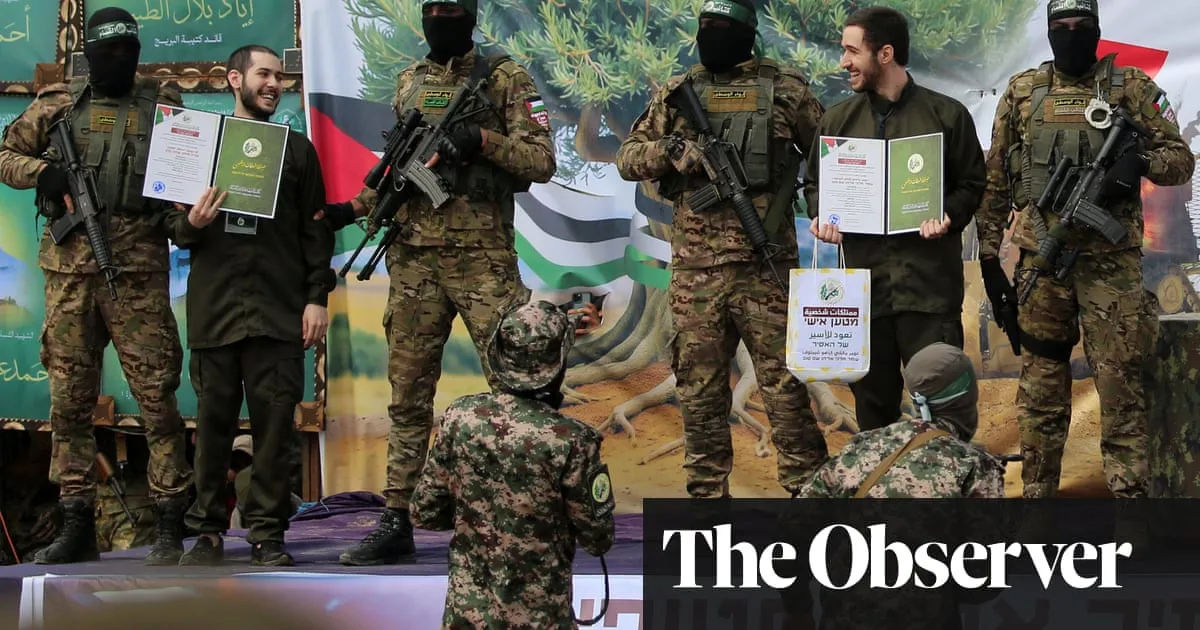
On Saturday, Hamas released six Israeli hostages, yet the anticipated exchange of over 600 Palestinian prisoners by Israel faced delays, threatening the fragile ceasefire agreement that has been in place for five weeks.
The Israeli government announced that the prisoner release would be postponed until at least after a planned security cabinet meeting on Saturday evening. This delay adds further tension to the already unstable truce, which is at a critical juncture between its first and second phases.
The first phase is scheduled to conclude next Saturday, but discussions regarding the second phase have not yet commenced. Hamas spokesperson Abdel Latif al-Qanou criticized Israeli Prime Minister Benjamin Netanyahu, accusing him of "procrastination and stalling tactics."
Al-Qanou stated, "The Israeli occupation’s failure to comply with the release of the seventh batch of prisoners in the exchange deal at the agreed-upon time constitutes a blatant violation of the agreement." While many Israelis prioritize the release of the remaining hostages, there is opposition from the right-wing faction of Netanyahu’s coalition, which advocates for resuming the war to dismantle Hamas.
The hostages released by Hamas included an Ethiopian-born Israeli and a Bedouin man, both known to have mental health issues, who had been held captive for a decade after inadvertently crossing into Gaza. Avera Mengistu, aged 39, crossed a barbed wire fence at the Gaza beach in September 2014. His family expressed their ordeal, stating, "Our family has endured 10 years and five months of unimaginable suffering."
Similarly, Hisham al-Sayed, a 36-year-old Bedouin from the Negev desert, entered Gaza from the east in April 2015 and was detained by Hamas. His father, Shaaban, expressed confusion and pain over his son's detention, stating, "He’s a man of peace, a man who wanted to reach Gaza."
Five of the hostages released on Saturday were part of ceremonies criticized by the Red Cross as cruel and disrespectful. During one ceremony, hostages including Omer Wenkert, Omer Shem Tov, and Eliya Cohen were presented alongside armed Hamas fighters, which was seen as a propaganda move.
Under the ceasefire agreement, Israel was to release 602 Palestinian prisoners, with 445 captured in the Gaza Strip since the outbreak of the war. These prisoners were scheduled to be released within Gaza, while others would be deported or transferred to the West Bank. Among them, 50 prisoners were serving life sentences.
Kobi Yakobi, head of the Israeli prison service, attempted to use these exchanges for political messaging, preparing sweatshirts with provocative inscriptions for the released Palestinians.
The recent release of six Israelis brings the total number of hostages freed by Hamas to 25 during the initial phase of the ceasefire. Additionally, Hamas has returned four bodies of hostages killed during the conflict, with plans to hand over more in the coming week.
The US special envoy, Steve Witkoff, has urged both parties to proceed to a second phase, which would involve the release of the remaining hostages and more Palestinian prisoners, along with a full Israeli withdrawal from Gaza.
Meanwhile, former President Donald Trump has expressed support for Netanyahu if he chooses to resume the conflict, citing recent incidents that have heightened tensions.